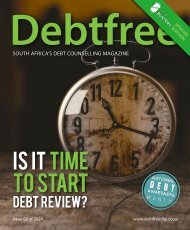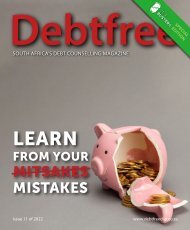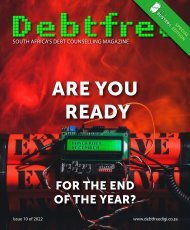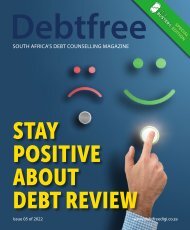Create successful ePaper yourself
Turn your PDF publications into a flip-book with our unique Google optimized e-Paper software.
SPECIAL<br />
EDITION<br />
BAD NEWS<br />
OVERLOAD<br />
Issue 04 of <strong>2022</strong>
EXCELLENCE IS DOING<br />
ORDINARY THINGS<br />
EXTRAORDINARILY<br />
WELL<br />
– John W. Gardner
WHAT MAKES US<br />
EXCELLENT?<br />
/ Unimpaired and automated PDA systems<br />
/ Integration with top-ranked <strong>Debt</strong> Counsellor systems<br />
/ Enhancing <strong>Debt</strong> Counsellor efficiency and sustainability<br />
/ Best customer support in the country – queries are resolved within 24 hours<br />
/ Strong compliance and best-industry-practice implementation is at our centre<br />
Call Chris van der Straaten<br />
Head of Hyphen PDA | 082 557 0437<br />
Or call our friendly support centre on 011 303 0060 - Option 2<br />
or visit our website www.hyphenpda.co.za
FROM THE EDITOR<br />
I don’t know about you but I think we needed these<br />
public holidays, just to relax for a bit and deal with all<br />
the bad news we have been hammered with recently.<br />
Our hearts go out to those suffering loss due to the flooding in KZN<br />
(and the aftermath), as well as those trapped in a war in Europe. Even<br />
all the court drama between Amber and Johnny can’t distract us from<br />
the serious nature of what’s been going on recently. A trip to the<br />
shops to buy cooking oil almost competes with a trip to the petrol<br />
station these days, crazy!<br />
Then you throw load-shedding into the mix. The word is that we<br />
might have as much as 100 days of load-shedding over the next few<br />
months.<br />
Maybe Eskom have the right idea though. If you become overloaded,<br />
you cant just carry on as normal, something has to change. So you<br />
shed some of the things weighing you down, could we learn to do<br />
the same?<br />
Too much debt? Well, maybe it’s time to reduce the monthly burden<br />
by starting debt review?<br />
Too much bad news? Well, maybe it is time to reduce our in-take?<br />
In this issue, we focus on how we can attempt to cope with all the<br />
bad news coming at us from every side. Don’t minimize how all this<br />
bad news is affecting your mindset and ability to be productive.
Check out how we can avoid becoming overwhelmed. Rather find<br />
out how to shed some of that load.<br />
We also share tips on how to get the most out of debt review,<br />
avoiding common mistakes as well as some financial and a little<br />
industry related news. Just to keep you in the loop.<br />
After a quick update on the <strong>Debt</strong> Review Awards (happening in<br />
September this year) we discuss why someone might want or need to<br />
change <strong>Debt</strong> Counsellors. We look at why it might be necessary, and<br />
why we might not want to be too quick to consider this option, find<br />
out if it is even an option.<br />
So, in the chiller days ahead, as you sit in Eskom-induced darkness,<br />
cooking your food on a stick over an open fire like an ancient<br />
peasant (or waiting for your Uber Eats delivery…whatever) consider<br />
if you could shed any excess bulk from your life. Dump that debt,<br />
ditch those negative people, shed some lockdown weight. It will not<br />
happen immediately, but give it some thought, make a plan.<br />
After all, good things come to those who wait. The first time someone<br />
tweeted to Elon Musk that he should just buy Twitter was back in<br />
2017, and here we are. So, take your time. Enjoy some relaxing time<br />
and don’t fail to plan (or plan to fail). Keep on paying that monthly<br />
debt repayment, continue taking steps towards being debt free.
FROM THE<br />
DESK<br />
IT DOESN’T<br />
HAVE TO BE A<br />
FINANCIAL STATE<br />
OF DISASTER<br />
<strong>Debt</strong> counselling is a<br />
proven solution for<br />
consumers wanting to get<br />
out of debt.<br />
In the recent past South<br />
Africans have experienced<br />
more than their share of<br />
disasters, from pandemics to<br />
floods and the latest round of<br />
loadshedding.
It is taking its toll. According to McKinsey & Company’s <strong>2022</strong><br />
Consumer Sentiment Survey, 71% of South African consumers report<br />
that their ability to make ends meet has declined over the past<br />
12 months and 87% describe their current economic situation as<br />
‘stretched’.<br />
They are responding by cutting back on spending, delaying purchases<br />
and substituting branded products for cheaper alternatives.<br />
“They are also applying for debt counselling in increasing numbers,<br />
with enquiries in the first quarter up 25% compared to the same<br />
period in 2021” says Benay Sager, head of <strong>Debt</strong><strong>Busters</strong>, South Africa’s<br />
leading and largest debt counsellor.<br />
He says that while it may seem counter-intuitive to consider the<br />
increase as positive it points to more consumers being committed<br />
about making changes to how they manage their financial affairs.<br />
“The important point is that while more people are experiencing<br />
money pressure, they are seeking help and debt counselling can be a<br />
very effective way of easing financial tension.”<br />
Specifically, it restructures debt, taking income and expenditure into<br />
account and setting a realistic budget so the consumer can afford the<br />
debt repayments.
The debt counsellor negotiates with credit providers regarding debt<br />
repayment terms. In the case of <strong>Debt</strong><strong>Busters</strong>, interest rates on most<br />
unsecured debt (which includes credit cards, personal loans, retail<br />
credit and overdraft facilities) are reduced from an average of 21.5%<br />
to ~1.2% per annum, enabling the consumer to pay back expensive<br />
debt more quickly.<br />
The consumer makes one monthly payment to a payment distribution<br />
agency, which then pays the credit providers. While under debt<br />
counselling consumers’ assets are legally protected as long as they<br />
keep up to date with the renegotiated debt repayments.<br />
Sager says <strong>Debt</strong><strong>Busters</strong> aims to get most consumers to repay their<br />
unsecured debt within four to five years and provides a support team<br />
to provide guidance and advice throughout the process to help<br />
clients successfully complete the journey.<br />
“We continue to provide assistance once people have received<br />
their clearance certificates by putting a plan in place and a budget<br />
that includes saving some money each month as a cushion against<br />
unexpected events and to invest in their future.”
DEBT REVIEW<br />
LESSON #1<br />
Beware of adverts on social media (like<br />
on Facebook) offering you a loan if you<br />
are already in debt review.<br />
Since this is illegal to do it is probably<br />
just a scam to try to trick you out of<br />
some money.
No more debt-stress.<br />
Let’s get it sorted.<br />
We’ll get your interest rates right down. You’ll<br />
make one consolidated payment a month. You’ll<br />
have more cash to live on. Your assets will be<br />
legally protected. Sorted.<br />
0861 365 910<br />
www.debtbusters.co.za<br />
info@debtbusters.co.za<br />
NCRDC2484
CONTENTS<br />
BAD NEWS OVERLOAD<br />
NEWS<br />
DEBT REVIEW<br />
AWARDS<br />
UPDATE<br />
SWITCHING DEBT COUNSELLORS<br />
DISCLAIMER<br />
<strong>Debt</strong>free Magazine considers its sources reliable and verifies as<br />
much information as possible. However, reporting inaccuracies<br />
can occur, consequently readers using this information do so<br />
at their own risk. <strong>Debt</strong>free Magazine makes content available<br />
with the understanding that the publisher is not rendering legal<br />
services or financial advice. Although persons and companies<br />
mentioned herein are believed to be reputable, neither<br />
<strong>Debt</strong>free Magazine nor any of its employees, sales executives<br />
or contributors accept any responsibility whatsoever for their<br />
activities. <strong>Debt</strong>free Magazine contains material supplied to<br />
us by advertisers which does not necessarily reflect the views<br />
and opinions of the <strong>Debt</strong>free Magazine team. No person,<br />
organization or party can copy or re-produce the content<br />
on this site and/or magazine or any part of this publication<br />
without a written consent from the editors’ panel and the<br />
author of the content, as applicable. <strong>Debt</strong>free Magazine,<br />
authors and contributors reserve their rights with regards to<br />
copyright of their work.
BAD NEWS<br />
OVERLOAD
BAD NEWS OVERLOAD<br />
SO MUCH<br />
BAD NEWS<br />
It seems that the only news<br />
these days, is bad news. This can<br />
negatively impact our mental health<br />
and cause us increased anxiety and<br />
stress. How can we deal with such<br />
an overload of bad news?<br />
It is hard to get away from bad news, news<br />
sites, papers and your social feeds are<br />
probably full of tragic stories about a looming<br />
5th wave of Covid-19, the war in Ukraine,<br />
floods in KZN, increasing cost of living, effects<br />
of climate change, crime and more.<br />
While it is true that these things are happening<br />
right now, and are therefore featured in the<br />
news, we are left with little time to process<br />
information about one disaster before we read<br />
about the next. Receiving such a constant<br />
flow of negative and scary information can be<br />
hard to deal with.
They say that the<br />
increased detailed<br />
reporting on wars<br />
(in distant lands) can<br />
make it feel like the<br />
war is happening<br />
around you.<br />
We may be exposed<br />
to pictures or video<br />
of event unfolding<br />
in real time. This<br />
stimulates the ‘fight<br />
or flight’ part of our<br />
brains and our bodies<br />
can actually physically<br />
react, producing<br />
certain chemicals. This<br />
can lead to mental<br />
and physical fatigue,<br />
as if we, personally,<br />
are trapped in that<br />
situation.
BAD NEWS OVERLOAD<br />
YOU NEED A<br />
REALISTIC VIEW<br />
It is not your imagination, things are very bad right<br />
now…perhaps worse in the last 100 years than they<br />
have ever been. As a species, we are in serious trouble,<br />
that’s why things seem so extreme.<br />
Not to dwell further on these negative things, but more people die in<br />
South Africa during crimes every day, than in most warzones. Crime<br />
has become a normal part of daily life for hundreds of thousands of<br />
South Africans. Xenophobia is creating the new apartheid mentality<br />
across the country, and people everywhere (not just SA) are protesting.<br />
They are unsatisfied with the way things are being handled by<br />
governments worldwide (even the very stable ones).<br />
We all know bad news sells better than good news. A sense of dread<br />
and horror-fascination will have people clicking additional links and<br />
turning pages more often than some feel good story. More page<br />
views means more ad sales and so, news outlets tend to primarily<br />
feature bad news.
BAD NEWS OVERLOAD<br />
HOW DO YOU TRY<br />
TO COPE?<br />
We are exposed to so much bad<br />
news, and are already anxious about<br />
those matters that when stresses<br />
and setbacks come along in our<br />
own lives (at work or home), it can<br />
hit us harder than normal.<br />
We all face challenges in our daily life, they are<br />
unavoidable. It might be the huge weight of<br />
debt sitting on your shoulders, health issues or<br />
an overwhelming and unrealistic workload.<br />
To try and take a break from such concerns,<br />
we might decide to watch a movie or check<br />
the news only to then be hit by reports of wars<br />
or warnings of massive price increases. Our<br />
TV shows may center on murder, war or social<br />
conflict (Hollywood often mirrors what’s<br />
happening in society). Instead of giving our<br />
brains the break we need, we may be diving<br />
deeper into negative influences.<br />
So, how can we deal with all this negativity<br />
and bad news?
BAD NEWS OVERLOAD<br />
LIMIT NEGATIVE<br />
NEWS<br />
If you are drowning in a sea of bad<br />
news, then it is time to limit your<br />
negativity intake.<br />
Maybe monitor how often you check negative<br />
news feeds. We do need to stay informed, but<br />
how often and in how much detail?<br />
Turning off the constant tap of bad news can<br />
offer us some respite.
BAD NEWS OVERLOAD<br />
FOCUS ON THE<br />
POSITIVE<br />
Once you have limited how much<br />
bad news you are receiving, then<br />
you can turn on the tap of positivity.<br />
Instead of thinking about all the bad things<br />
that might happen, why not spend some time<br />
thinking about all the good things and people<br />
you have in your life?<br />
Good friends, good food, a beautiful day,<br />
some nice surrounding. These are all things<br />
that can remind us of the good in the world<br />
around us.
BAD NEWS OVERLOAD<br />
STICK TO A<br />
ROUTINE<br />
A regular routine that includes<br />
getting enough sleep at regular<br />
times, eating meals and handling<br />
needed chores can help your brain<br />
feel relaxed and refreshed.<br />
Getting stuff done, rather than procrastinating<br />
also provides a sense of accomplishment that<br />
is good for you.
BAD NEWS OVERLOAD<br />
HELP<br />
OTHERS<br />
Lockdown forced us all to isolate<br />
and avoid other people. Many of us<br />
are still avoiding others due to our<br />
fear of infection.<br />
That’s natural and logical but isolation can<br />
lead us to be more self-focused than normal.<br />
This can leave us with way too much time to<br />
focus on our own problems. This could make<br />
us blow our problems out of proportion –a<br />
typical ‘mountain out of a molehill’ situation.<br />
Shifting focus to helping others around us,<br />
maybe in our family, friends or community,<br />
can get us out of this selfish and negative<br />
mindset and allow us to expand our horizons.<br />
Furthermore, helping others releases feelgood<br />
chemicals in our brain that promotes<br />
positive feelings and less worry.
BAD NEWS OVERLOAD<br />
IMPROVE YOUR HEALTH<br />
EXERCISE<br />
Getting regular exercise can also<br />
help us feel better.<br />
Eating healthy and taking care of our physical<br />
health will have long lasting benefits, and can<br />
make us feel better right now. Most of us are<br />
still dealing with our extra lock-down weight<br />
(thanks Covid, now I need to go buy bigger<br />
clothes).<br />
Including some appropriate physical activity<br />
into our routine can help us a lot. We look<br />
and feel better, we accomplish a short<br />
term goal every time we workout or go for<br />
a walk (or run) which gives us a sense of<br />
accomplishment.<br />
But please give it a few months before you<br />
start buying shirts with cut off sleeves just to<br />
show off your “guns”.
BAD NEWS OVERLOAD<br />
IMPROVE YOUR HEALTH<br />
SLEEP<br />
Getting enough sleep can really<br />
assist us cope with our stress.<br />
Lack of sleep reduces our ability to deal with<br />
pressure and kills our ability to concentrate<br />
when needed. So, make sure you get enough<br />
rest.<br />
If you struggle to sleep, then you should try<br />
to set a realistic time to regularly go to bed<br />
and wake up, and try stick to it. Over time this<br />
pattern will help prepare your body and mind<br />
for sleep.<br />
Avoid TV watching or social media surfing in<br />
bed just before you go to sleep (you know you<br />
do…). Those bright stimulating screens are not<br />
conducive to falling sleep.<br />
Avoid big meals, alcohol and caffeine just<br />
before bedtime, they don’t help you get a long<br />
restful sleep.
BAD NEWS OVERLOAD<br />
DEALING WITH JOB<br />
INSECURITY<br />
These days, unfortunately, nobody<br />
can say their job is 100% safe. So,<br />
how can we deal with anxiety about<br />
job security?<br />
Maintain a good attitude about your job,<br />
even if it isn’t your “dream job”. Consider the<br />
benefits you do get from your job (like a salary<br />
that pays most of your bills).<br />
Be a good employee; arrive on time, leave on<br />
time. Earn your salary by giving your employer<br />
value for money. Be industrious and reliable.<br />
Even if you do lose your employment due to<br />
factors beyond your control, you can then be<br />
assured of positive recommendations for you<br />
next job application.
BAD NEWS OVERLOAD<br />
TAKE ACTIVE STEPS TO<br />
REDUCE<br />
STRESS<br />
Like ‘bad news overload’ we can have<br />
an overload of things that stress us<br />
out every day. We can normally deal<br />
with some stress, but not too much.<br />
Can you take action to reduce some of the<br />
causes of your stress?<br />
Could you reduce the time you spend with<br />
negative people?<br />
Could you adjust your routines or living<br />
situation to reduce stress?<br />
Often money matters are some of our biggest<br />
causes of anxiety. If you need advice on how<br />
to get the most out of the money you do earn<br />
each month, then talk to a <strong>Debt</strong> Counsellor<br />
about budgeting and debt. They can help you<br />
take positive steps to effectually manage your<br />
finances.
BAD NEWS OVERLOAD<br />
CAN WE HAVE POSITIVE MINDSET ABOUT<br />
WORLD EVENTS?<br />
If you have been paying off your debt, then you will<br />
know that positive change takes real effort & time.<br />
Worldwide, it is true that big changes are needed on almost every<br />
level of society to deal with what is happening. Sometimes people<br />
only react when things directly impact on them. The long-standing<br />
social structures that are in place, often feel threatened by change,<br />
and so they try carry on as normal, for as long as possible to avoid<br />
discomfort or financial cost. This is often why it is the younger<br />
generation that rebel against the status quo.<br />
These days it seems half the rich people want to disappear into a<br />
virtual world or jet off into space to get away from our problems. We<br />
may also not know what to do.<br />
It is important for us to consider what we have direct control over,<br />
and what we don’t. Can we improve things among our family, friends,<br />
colleagues or community?<br />
You may not be able to control fire tornados in Australia, but perhaps<br />
you can help a family member deal with a crisis, or provide needed<br />
support to those less fortunate or struck by disaster.<br />
Do what you can.
BAD NEWS OVERLOAD<br />
NO MORE<br />
OVERLOAD<br />
If you have been feeling tired and worn<br />
down by all the bad news around us,<br />
then it is time to make a change.<br />
Stress is unavoidable, but not always a bad<br />
thing. Our brains are built to handle stress, but<br />
we need to avoid being overwhelmed.<br />
Try to reduce the amount of negative news<br />
you get each day, while increasing the focus<br />
on the positive things in your life. Eat healthy,<br />
get enough suitable exercise and rest to help<br />
you feel better.<br />
Find ways to reduce your stress by taking<br />
action rather than procrastinating (like by<br />
entering debt review if you are overwhelmed<br />
by debt stress). Focus on what you can<br />
change in your life, and immediately around<br />
you. Shift focus off your own problems and try<br />
to help others, have a positive impact on your<br />
family, friends and community.<br />
It’s time to say “No” to bad news overload.
CONSUMER FRIEND<br />
USES<br />
SOFTWARE TO ENSURE<br />
POPIA COMPLIANCE!<br />
- Secure system-to-system data transfer (no human contact)<br />
- Elimination of data exposure from the use of email<br />
- Data specification is fit for purpose<br />
POPIA COMPLIANCE IS<br />
CRUCIAL THIS YEAR!
DEBT REVIEW<br />
LESSON #2<br />
SCAM ALERT<br />
Be careful if another person calls and says<br />
they can suddenly reduce your monthly debt<br />
review repayment amount. Many scams<br />
start that way. Rather talk to your own <strong>Debt</strong><br />
Counsellor.
BREAKING<br />
NEWS
IMPROVED INTERNATIONAL<br />
INVESTMENT RATINGS?<br />
In 2020 SA was downgraded by Moody’s rating agency to<br />
what is commonly referred to as “Junk” status. This meant<br />
that many larger investors and funds had to pull out and<br />
start investing elsewhere.<br />
With the continuing pandemic, riots and political uncertainty,<br />
the rating continued to drop during lockdown. Moody’s kept<br />
saying things would probably get worse and worse.<br />
Moody’s have now made a significant change and adjusted<br />
their official ‘negative’ outlook to a much better ‘stable’ one.<br />
This means they do not feel things are getting worse. They<br />
will now wait and see how things progress.<br />
These ratings were, however, made before the KZN flooding<br />
and recent announcements regarding loadshedding.
CONSUMERS WITH BAD<br />
CREDIT RECORDS<br />
27 Million South Africans use credit each month. Out of<br />
this rather large number (which far exceeds the number of<br />
people who are employed in South Africa) 48% and have<br />
recently missed payments.<br />
A very large percentage of credit users have not made<br />
payments for 3 months or more (on, at least, some of their<br />
debts).
IMAS DEBIT ORDER<br />
CANCELLATIONS ON TRACK<br />
The <strong>Debt</strong> Counsellors Association of South Africa (DCASA)<br />
recently engaged with credit provider Imas (Iemas) about<br />
their past hesitancy to cancel debit orders on accounts<br />
where they received a debt restructuring proposal they did<br />
not like.<br />
The situation has now been resolved in line with the 2009 task<br />
team recommendation (later turned into an NCR guideline).<br />
Another good example of how industry challenges can often<br />
be resolved through good communication and cooperation<br />
to the benefit of consumers in debt review.
EDCON PAID-UP<br />
LETTERS<br />
Consumer Friend are busy dealing with a small third-party<br />
system related challenge where some Edcon accounts were<br />
prematurely marked as paid up…but this was done in error.<br />
Though the paid-up letters were made available and the<br />
balance initially shown as zero, Consumer Friend, in order<br />
to assist with a speedy resolution, have now asked for these<br />
accounts to be put back into distribution via the PDAs.<br />
In some cases the still outstanding amount is quite small<br />
but many are between R300 – R600, according to several<br />
<strong>Debt</strong> Counsellors that <strong>Debt</strong>free spoke to.<br />
What this means is that these consumers have to now be<br />
told that the paid up letter is not accurate and they actually<br />
still owe money to the credit provider even though they<br />
thought they had reached the milestone of paying off the<br />
debt. Some awkward conversations indeed.<br />
It also means the <strong>Debt</strong> Counsellors have to take time to go<br />
back onto the PDA system and restructure matters across<br />
all remaining account so that the accounts get the payment<br />
working towards the new balance. This unfortunately has<br />
a knock on effect, in many cases, of delaying cascading<br />
payments to other credit providers.<br />
Consumer Friend is contacting <strong>Debt</strong> Counsellors whose<br />
clients may have been impacted.
STEP-BY-STEP<br />
DREX GUIDE<br />
DREX simplifies the exchange of data and makes managing the<br />
debt review process less admin intensive.<br />
The below links take you to step-by-step guides on how to use the<br />
DC Portal on DREX.<br />
How to Register on the DC Portal<br />
Introduction to the DC Portal<br />
Accessing a Consumer's Profile
SWITCHING<br />
DEBT<br />
COUNSELLORS
SWITCHING DEBT COUNSELLORS<br />
I MET SOMEONE<br />
NEW<br />
Some people wonder if it is possible<br />
to switch from the services of one<br />
<strong>Debt</strong> Counsellor to another.<br />
Although this is not common or recommended,<br />
it is possible. Let’s look at why you might want<br />
to change <strong>Debt</strong> Counsellors, and some things<br />
you should be very careful of.
SWITCHING DEBT COUNSELLORS<br />
WHY WOULD YOU<br />
CHANGE?<br />
Some reasons for a change are more obvious than<br />
others. For example, a <strong>Debt</strong> Counsellor may have<br />
passed away, and this would mean that the consumer<br />
has no one to represent and advise them.<br />
Even if the <strong>Debt</strong> Counsellor is alive, they may no longer be practicing.<br />
The entire <strong>Debt</strong> Counselling practice may have closed down due to<br />
business challenges. This would mean that the consumer would have<br />
no one to look after their interests. They would need a new <strong>Debt</strong><br />
Counsellor to help.<br />
There are other reasons too. The National Credit Regulator may have<br />
found that the <strong>Debt</strong> Counsellor was not doing their job well, and may<br />
have asked the NCT to take away their registration (normally they will<br />
then just decide on a new <strong>Debt</strong> Counsellor for you without asking<br />
you, but you could chose your own).<br />
You may be getting really poor service from your <strong>Debt</strong> Counsellor.<br />
Even if you have spoken to them and explained the level of service<br />
you require, you may still not be happy. You may find that they never<br />
answer their phones or answer your emails. They may not provide<br />
you with any advice, or help when challenges come up. So, you may<br />
prefer to move to the services of a different <strong>Debt</strong> Counsellor who has<br />
a good reputation.
SWITCHING DEBT COUNSELLORS<br />
THINGS TO<br />
WATCH<br />
OUT FOR<br />
If someone calls you and says they<br />
can help you pay less towards your<br />
court ordered debt review each<br />
month, do not be too hasty to take<br />
them up on their offer.<br />
1. One reason for caution is that you<br />
may be the target of a scammer. The<br />
scammer may promise much lower<br />
repayments but ask you to pay the<br />
monthly debt repayment amount into<br />
a new bank account (their own). They<br />
could then run off with the money<br />
and leave you in a lot of trouble with<br />
your credit providers. Remember, there<br />
are only 4 NCR registered Payment<br />
Distribution Agents in South Africa.<br />
Changing <strong>Debt</strong> Counsellors may not<br />
mean changing PDAs. No change on the<br />
PDA side of things is much safer.
2. Since debt review is done via the courts,<br />
and the magistrates decide how much<br />
you pay (not the <strong>Debt</strong> Counsellors who<br />
just make suggestions) any promise<br />
by someone to lower your repayment<br />
cannot be guaranteed. If the matter has<br />
to go back to court, you may have to pay<br />
additional legal fees and the Magistrate<br />
may still feel you can afford the exact<br />
same repayment amount as you have<br />
been paying. After all, your credit<br />
providers are likely to ask the court for<br />
the same amounts as before.<br />
3. Many consumers have been convinced<br />
to switch DC’s with promise of lower<br />
instalments or even the chance to get<br />
out of debt review. Unfortunately after<br />
they pay some fees, they often struggle<br />
to get hold of the company again, and<br />
soon find out their debts have not been<br />
paid and they are facing legal action from<br />
credit providers. Alternatively, consumers<br />
are told they don’t qualify to leave debt<br />
review anyway, and must carry on paying,<br />
but by then some credit providers may<br />
have started new legal action.
SWITCHING DEBT COUNSELLORS<br />
CLICK CLICK DONE<br />
IS IT ALWAYS<br />
THAT SIMPLE?<br />
The NCR have a database which<br />
records which <strong>Debt</strong> Counsellor the<br />
consumer has signed up with. Any<br />
change from one <strong>Debt</strong> Counsellor<br />
to another is also recorded on this<br />
database system. The new <strong>Debt</strong><br />
Counsellor clicks a few buttons and<br />
the previous <strong>Debt</strong> Counsellor can do<br />
the same, to speed things along.<br />
Of course that’s the relatively easy part.<br />
Letting all your credit providers know about<br />
the change, and making sure they send emails<br />
and documents to the right <strong>Debt</strong> Counsellor<br />
(and not the old one) can present challenges.<br />
Sometimes however, there can be some<br />
hiccups in transferring from one <strong>Debt</strong><br />
Counsellor to another. The previous <strong>Debt</strong><br />
Counsellor may say that fees for services have<br />
not been paid yet (so they may decline the
CLICK CLICK DONE<br />
IS IT ALWAYS THAT SIMPLE? CONT’D<br />
transfer) or The <strong>Debt</strong> Counsellor may refuse<br />
to do the transfer because they are scared the<br />
consumer is being scammed.<br />
We spoke to Mr. Timmy van der Grijp, who<br />
worked at the NCR (now at VDGC Consulting)<br />
for many years, about why this can happen.<br />
Timmy says: ”On many occasions I heard the<br />
same <strong>Debt</strong> Counsellor arguing in favour of a<br />
transfer, and then later that same week against<br />
such transfers.”<br />
Why would this be? He says its: “depending if<br />
they were the one requesting or declining the<br />
transfer request.”<br />
It is not exactly a straight forward situation<br />
(especially when it comes to outstanding<br />
fees).<br />
Timmy continues: ”On the one hand, it is<br />
argued that the DC must be paid for the work<br />
done, and on the other it is said that there is<br />
no lien supported by law to justify any decline<br />
of a consumer transfer request, because of<br />
outstanding fees.”
VDGC is holding<br />
an in-depth 2 hour<br />
workshop on the topic<br />
during May.<br />
DATE: 10th May<br />
TIME: 2pm<br />
FEE: R100<br />
For those who would<br />
like to dive into the<br />
topic you can book<br />
online at:<br />
www.vdgc.one
SWITCHING DEBT COUNSELLORS<br />
TO SWITCH OR<br />
NOT TO SWITCH?<br />
If your <strong>Debt</strong> Counsellor has passed away, or their<br />
business is going to stop practicing, you 100% need<br />
to make a change. Normally, the NCR or the <strong>Debt</strong><br />
Counsellor themselves will assist in such cases.<br />
If you are not getting the level of service you want from your <strong>Debt</strong><br />
Counsellor, do not be quick to try change. It is a complex thing and<br />
comes with some challenges.<br />
First, speak to your current <strong>Debt</strong> Counsellor and tell them why you<br />
are not happy. Do not speak to a junior staff member about such a<br />
matter - talk directly to your actual <strong>Debt</strong> Counsellor.<br />
If you are having problems with the PDA or getting calls or letters<br />
from a credit provider, then your current <strong>Debt</strong> Counsellor will help<br />
you sort out the issues.<br />
IMPORTANT: Make sure the <strong>Debt</strong> Counsellor and PDA<br />
have your correct contact info. This can have a big<br />
impact on receiving communication from them.
SWITCHING DEBT COUNSELLORS<br />
PLEASE BE<br />
CAREFUL<br />
Change is sometimes necessary<br />
but be careful of being lured into<br />
making a change.<br />
If you are thinking of making a change, ensure<br />
that you are dealing with an NCR registered<br />
<strong>Debt</strong> Counsellor (ask for their certificate) and<br />
be careful if they ask you to change the bank<br />
account you pay your debts to. Feel free to<br />
contact the PDA and check the bank details<br />
with them.<br />
When considering a change be sure to go<br />
onto sites like HelloPeter.com and read the<br />
customer reviews about the practice. Check if<br />
they have a professional website. If they have<br />
lots of bad reviews, or only have a Facebook<br />
page then please beware!
WWW.DEBTREVIEWAWARDS.CO.ZA
The <strong>Debt</strong> Review Awards Gala will be held in<br />
September <strong>2022</strong>.<br />
The event will be a combination a (Covid-19 cautious) in person event<br />
and live streamed online (a hybrid event) so that some will be able to<br />
attend in person (in Cape Town) and others will be able to log in via<br />
Youtube (as has been done the past 2 years) to enjoy all the action.<br />
<strong>Debt</strong> Counsellors and credit providers will be able to oganise viewing<br />
parties at their offices so that all can enjoy the event live.<br />
Peer Reviews<br />
The annual peer reviews are ongoing. All NCR registered credit<br />
providers and <strong>Debt</strong> Counsellors are included in the review pool (and<br />
do not have to sign up to be reviewed).<br />
Want To Check If You Are Included? Email:<br />
<strong>Debt</strong>ReviewAwards<strong>2022</strong>@debtfreedigi.co.za<br />
Soon communications regarding the peer reviews will transition from<br />
only the official NCR database contact list of all credit providers and<br />
<strong>Debt</strong> Counsellors to be supplemented by the Awards organizers<br />
contact list. This should ensure that any who have changed contact<br />
info or who have specifically signed up to be contacted will receive<br />
an opportunity to review their peers.<br />
Additional invites to participate will be provided via social media and<br />
various credit provider and <strong>Debt</strong> Counsellor Associations and groups.
DEBT REVIEW<br />
LESSON #3<br />
Try to beat your own<br />
monthly budgeting<br />
goals.<br />
Always try to have a little left over at the<br />
end of each month. That way you can save<br />
extra towards unplanned expenses.

















